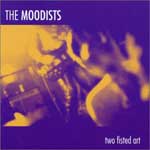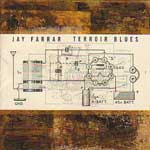Do The Rubber Neck | |

| I've had a double CD set by The Moodists sitting on my desk for what seems like months now, waiting for inspiration to strike and words to take shape. To be honest I still don't quite know what to say about it, but then some things never change. I never really knew what to make of the Moodists when they were around in the ´80s, mainly I guess because I had no clue and believed what the music press wrote. So when the music press said that The Moodists were in the same vein as fellow Australian's The Birthday Party, I went along with it. And since I was aware even in my dim witted bubble of hick-town youth that some kind of division existed between Rock and Non-Rock and that the Birthday Party were assuredly ´Rock', so it followed that The Moodists were also ´Rock' and hence at best not to be trusted and at worst to be openly vilified. Ah, the pleasures of being young and stupid.
Looking back, and listening to Two Fisted Art now with more understanding of context and more courage in my convictions I see that really The Moodists were indeed ´Rock', and that more than this, they were in the finest tradition of Rock bands, drawing inspiration and influence from the garage and the Velvets; from greasy, sublime '50s Pulp Pop imagery; that they sounded in fact like a demented band of rural punks starring in a Kenneth Anger movie. So whilst I would certainly not have bought The Moodists records when I was a kid, these days I'd heartily recommend them to anyone with a modicum of soul and a passion for the ´right' kind of Rock sound. These days, I wouldn't go out and buy the sort of stuff that Gringo records releases, but I'm sure glad they send it to me, because it's the kind of sound that will often jerk me out of complacency, make me reach out to tweak the volume up that bit higher to blow away the cobwebs. So it is with Kill Yourself's Soft Touch of Man and Clambake's There's a Gator In The Pool. Sleeve notes on Soft Touch of Man ask ´Do you like skateboarding? Do you like Hardcore?' Well, not really and I wouldn't especially say so, but I do like the angular metallic edge Kill Yourself make. It reminds me somewhat of Rodan, and that's no bad thing once in a while. Clambake meanwhile make a psych(o)-surfrock that is madly refreshing, but I doubt many surfers will dig it. They'll doubtless be too busy getting off on their favoured luke-warm watered down ´funk' and big beats, or, uh, Reef (do Reef still exist, or are they thankfully now extinct?) or whatever the hell it is they favour these days. Clambake though have a sweet cider stagger and guitars that sound so gritty it's like they got sand on the tapes. All of which makes me want to say something that a music journalist might say, like ´Clambake are to surf music what the Dirtbombs are to the Blues and Soul'. But I won't. |

| The Acuarela label, on the other hand, generally release exactly the kind of stuff I'd go out and buy, if only it were possible to find any of it in Exeter record stores. Thankfully the beauty of the Internet makes it possible to ignore these quirks of location, and it ought to be easy for anyone to pick up the latest releases. First off there's a single by Manta Ray; a remixed version of ´Take A look' which was a highlight of their Estratexa album. This version is, if anything, even more spacey, dubbed out and spooked; an Eagle ride through a nebula on Mogadon. It's terrific.
Emak Bakia meanwhile return after the tempting delights of their 'Un Cuerpo Extrano' EP with the Frecuencias de un rojo devastador (Frequencies of a devastating red) album. It's similarly quirky and adventurous, bookending a collection of captivating collaged electronic diversions with two delicious forays into the realms of acoustic folk. Certainly one of the most intriguing albums I've listened to lately, and one I come back to again and again. Highly recommended. Continuing the acoustic folk thread is the split CD release by Julie Doiron and Okervil River. Some might recognise Doiron from her time in Eric's Trip, others yet may be familiar with her string of solo albums since the Canadian band split in 1996. Personally I'm not familiar with that work, although listening to the five songs here I am sorely tempted to seek them out. The tracks here were all recorded at her home in the mornings and evenings of December 2002 and are punctuated by background noises seeping through from the rest of the house. It's living, breathing music and is all the more beautiful for the smudges and scratches. Hailing from Austin, Texas, Okervil River, meanwhile, offer a more fleshed out sound. There's still a strong Folk flavour here though, with traditional song ´Omie Wise' rubbing shoulders with Will Sheff originals like ´He Passes Number Thirty-three'. Okervil River chart the highs, lows and all points in between with their four cuts, making a dynamic folk that acts as a fine counterpoint to the universal softness of Doiron's five songs. It all adds up to a great split album. Despite the squalling electronics of the ´Intro', to their Small Town Murder Scene, Canada's FemBots also make a dynamic folk-oriented sound that is well worth investigating. Songs like ´Prison Memoirs of An Anarchist', ´A Million Dead End Jobs' and the album's title track all conspire to create the impression of contemporary Hackberry Ramblers of the urban environment. Which can only be a Good Thing. |

| Jay Farrar of course
is by now an Old Hand when it comes to contemporary folk/country, and with
his Terroir Blues album he moves further out from the places we've come to expect him to inhabit. So in place of the more clearly defined rock-derived sounds of previous solo recording Sebastopol and albums with Son Volt and of course the peerless Uncle Tupelo, Terroir
Blues instead sees Farrar on a more introspective trip, investigating the interface between folk/country and gentle psychedlia as well as that between traditional folk/country song structures and instruments and electronics and studio techniques. It makes for a much less immediate album than Sebastopol, but one that rewards continued listening, and one that suggests Farrar is charting new waters here; is looking for a way to take the rich tradition of American Folk and Country music forward into the 21st century, making something that is invested with history's depth yet also in some way New (and without sounding like experimental for the sake of experiement). As such Terroir
Blues sounds almost like a working document, a sketchbook where ideas are being worked out in public. And whilst it's a fascinating album in its own right, I can't
help but look forward to where these sketches might lead in the future.
© 2003 Alistair Fitchett |